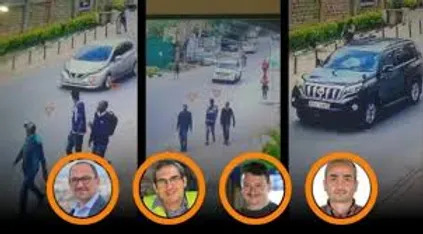The kidnapping of seven men, women and a child and forcible return of four refugees to Türkiye on Friday 18 October redefined Kenya’s standing as a place of safety and sanctuary for close to a million refugees and asylum seekers. What implications does last week’s bilateral Türkiye-Kenya deal pose for Kenya Kwanza administration’s refugee policy and obligations to the international community?
In a coordinated operation that must have taken weeks of surveillance and planning to execute, seven Turkish urban refugees were filmed being snatched off several Nairobi streets harmlessly heading to school or going to work. An initial statement that the matter was under investigation by the Police Spokesperson was contradicted three days later by the Foreign Affairs Principal Secretary who declared the operation was official and was necessitated by the “robust historical and strategic bilateral relations” with Türkiye government.
Abdullah Genç (16), Necdet Seyitoğlu, and Saadet Taşçı were held incommunicado for several hours and released. Mustafa Genç (Abdullah’s father), Alparslan Taşçı (Saadet’s husband), Öztürk Uzun and Hüseyin Yeşilsu were handed over to the Turkish Anti-Terrorism unit (TEM) and according to news reports, are now being held in a police station in Ankara, Türkiye. The incident will be a classic case-study for international relations and human rights students for decades. For those charged with protecting the world’s most vulnerable, it will take some time to recover from severe whiplash.
The principle of non-refoulement is a bedrock of refugee protection. Recognised in international humanitarian law for more than seventy years, the 1951 United Nations Refugee Convention and its 1967 Protocol, the 1969 OAU Convention on refugees and the 2021 Refugee Law of Kenya explicitly prohibit the return of refugees to a place where they are likely to face the very danger from which they fled. These obligations cannot be traded for commercial, diplomatic or trade interests without violating both national and international law.
That this happens as the Kenya Kwanza administration was making several refugee policy and programming breakthroughs makes this even more inexplicable. In 2021, the Kenya Refugee Act upgraded our laws to international human rights standards. Refugees are now permitted to open bank accounts, own SIM cards and apply for work permits. These measures seek to reduce refugee dependency on dwindling humanitarian aid.
As North America and European countries repeatedly disrespect their responsibility to protect refugees, Kenya has stood out by generously hosting millions of refugees for decades. The registration of 10,000 Makonde, Shona and Pemba stateless community members in 2016, 2021 and 2023 has been admired internationally. The lifting of discriminatory national ID vetting processes across 20 marginalised border and urban communities in May 2024 has also been significant. Last month, the Refugee Commissioner publicly assured refugees and asylum seekers that their safety and well-being was the Government’s top priority.
Next month, President Ruto is expected to launch the Shirika Plan. The plan seeks to transform the sprawling camp-cities of Dadaab and Kakuma into open settlements that will allow refugees to integrate, live, work and contribute to the national economy alongside Kenyans. It is ironic that from public accounts, the four urban refugees refouled last Friday had already accomplished this and more.
The Shirika Plan requires Sh115.6 billion to implement the first phase of the four-year project. Without significant foreign investment in human capital, infrastructure and technology, it’s noble goals will be difficult to achieve. This week, United Nations High Commissioner for Refugees Filippo Grandi is anticipated in Nairobi to review progress and support.
That those party to the Türkiye-Kenya deal chose this peculiar moment for a “refoulement most foul” appears self-destructive. Perhaps it is worth reminding them of Warsan Shire’s poem ‘home”,
“No one leaves home unless
home is the mouth of a shark
You only run for the border
when you see the whole city running as well”
Last week’s abduction and refoulment offended our national integrity, broke our laws and those of the international community. This stain will take a lot to rinse out. Over to you GoK.
Irũngũ Houghton is Amnesty International Kenya Executive Director and writes in his personal capacity. Email: [email protected]


